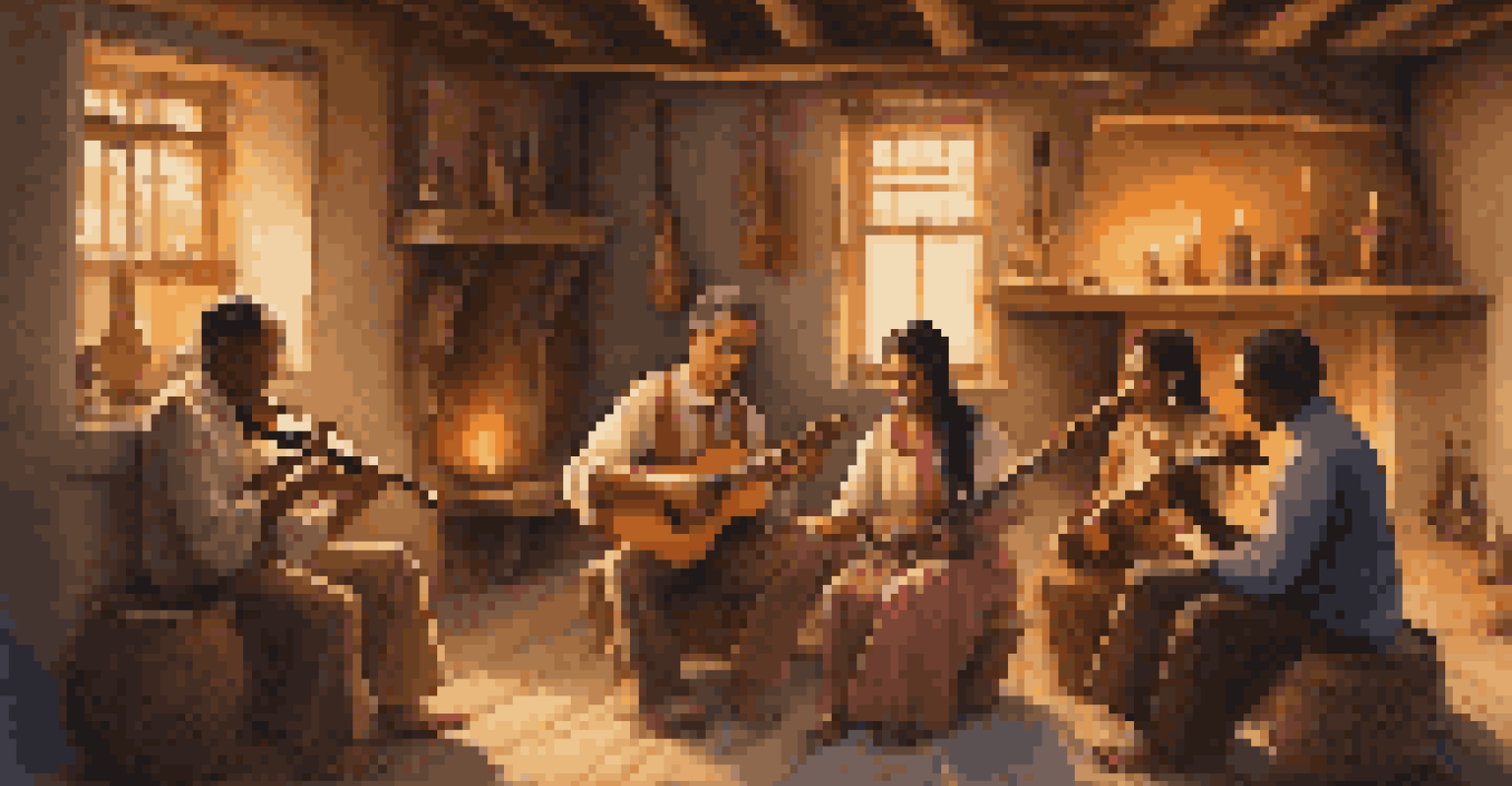The Role of Traditional Music in Contemporary Cultural Movements

Understanding Traditional Music and Its Roots
Traditional music is a rich tapestry woven from the sounds and stories of a culture's past. It embodies the collective experiences of a community, often passed down through generations. These melodies and rhythms are not just entertainment; they carry the history, values, and beliefs of a people.
Music is the universal language of mankind.
By understanding traditional music, we gain insight into the cultural identity it represents. For example, Indigenous songs often reflect the connection to the land and ancestral knowledge. This deep connection makes traditional music a powerful vehicle for cultural expression and preservation.
In today's fast-paced world, where globalization often overshadows local traditions, this music serves as a reminder of our roots. It helps communities maintain a sense of belonging and pride, anchoring them in their unique histories amidst the noise of modern life.
Traditional Music as a Tool for Cultural Resistance
Throughout history, traditional music has played a crucial role in cultural resistance movements. When faced with oppression or colonization, communities often turn to their music to reclaim their identity and assert their rights. This is evident in various movements, from the civil rights era in the U.S. to Indigenous rights worldwide.

For instance, the protest songs of the 1960s used traditional melodies and themes to unite people against injustice. These songs not only raised awareness but also fostered a sense of community among those fighting for change. They remind us that music can be a powerful weapon for social justice.
Cultural Identity Through Music
Traditional music serves as a powerful reflection of a community's history, values, and cultural identity.
By infusing contemporary issues with traditional sounds, artists today continue this legacy. They craft songs that resonate with current struggles while honoring their cultural heritage, creating a bridge between the past and present.
The Fusion of Traditional and Contemporary Sounds
One exciting trend in today's music scene is the fusion of traditional and contemporary sounds. Artists are blending age-old melodies with modern genres like hip-hop, pop, and electronic music. This not only revitalizes traditional music but also introduces it to new audiences who might not otherwise engage with it.
Traditional music is the lifeblood of a culture, a powerful vehicle for expression and resistance.
For example, musicians like Hozier and Shakira have incorporated traditional elements into their hits, creating a unique sound that pays homage to their roots. This blending of styles encourages a dialogue between generations, allowing younger listeners to appreciate the beauty of traditional music.
Moreover, this fusion often sparks conversations about cultural appropriation and authenticity. As artists navigate these complex waters, they contribute to a broader understanding of how cultures can share and celebrate their influences.
Traditional Music in Global Social Movements
In recent years, traditional music has emerged as a vital component of global social movements. From climate change protests to gender equality campaigns, music serves as a rallying cry, uniting people across borders. The melodies of traditional songs often evoke strong emotions, making them perfect for inspiring action.
For instance, during the Fridays for Future movement, traditional songs from various cultures were sung to highlight the urgency of climate action. These performances not only spread awareness but also fostered a sense of unity among diverse groups. They remind us that we are part of a larger, interconnected world.
Music as a Tool for Resistance
Throughout history, traditional music has been instrumental in cultural resistance movements, uniting communities against oppression.
As social movements become increasingly global, the inclusion of traditional music helps to highlight local perspectives and solutions. This enriches the conversation, allowing for a more nuanced understanding of issues that affect us all.
Preservation of Cultural Heritage Through Music
As globalization continues to influence our world, the preservation of cultural heritage becomes more crucial than ever. Traditional music plays a significant role in this preservation, serving as a living archive of a culture's history and values. By keeping these musical traditions alive, communities can ensure that their unique identities endure.
Organizations and initiatives worldwide are dedicated to documenting and promoting traditional music. By recording songs, hosting workshops, and providing platforms for artists, they help safeguard these cultural treasures for future generations. This not only benefits the communities involved but enriches the global cultural landscape.
In this digital age, technology also aids in preservation efforts. Online platforms allow traditional music to reach wider audiences, fostering appreciation and engagement with diverse cultures. As people connect through music, they become more aware of the importance of preserving these traditions.
The Role of Music Festivals in Cultural Exchange
Music festivals have become a vibrant space for cultural exchange, showcasing traditional music alongside contemporary genres. These events allow artists from different backgrounds to collaborate, creating a melting pot of sounds and ideas. By bringing together diverse musical styles, festivals promote understanding and appreciation of various cultures.
For example, festivals like WOMAD (World of Music, Arts and Dance) celebrate traditional music from around the globe, inviting audiences to experience the richness of different cultures. Such events not only entertain but also educate attendees about the significance of the music and its cultural context.
Fusion of Old and New Sounds
The blending of traditional and contemporary music creates new dialogues, engaging younger audiences while preserving cultural heritage.
Through these shared experiences, music festivals foster a sense of community and belonging. They highlight the universal language of music, proving that regardless of our differences, we can come together to celebrate our shared humanity.
The Future of Traditional Music in Cultural Movements
Looking ahead, the future of traditional music in cultural movements appears promising. As more artists recognize the value of their heritage, we can expect to see a continued blending of traditional and modern sounds. This evolution not only keeps the music alive but also ensures its relevance in contemporary society.
Moreover, as global issues become increasingly urgent, traditional music will likely remain a powerful tool for advocacy and resistance. It has the ability to convey complex emotions and stories, bridging cultural divides and inspiring collective action.

As we embrace this future, it's essential to support and uplift traditional musicians. By valuing their contributions, we ensure that the rich tapestry of cultural expressions continues to thrive, creating a vibrant and inclusive world for everyone.